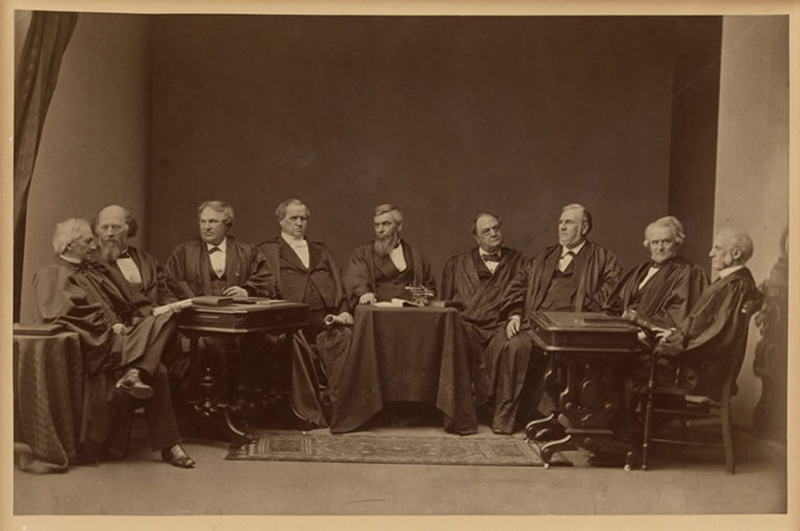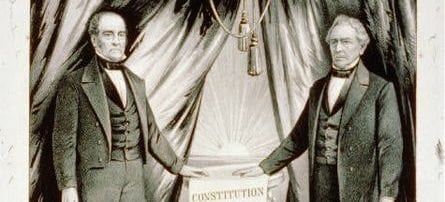Introduction
The General Land Office within the U.S. Department of the Interior was responsible throughout the nineteenth century for managing the land owned by the national government, including the sale of public land to private owners. As the national government expanded westward, it gained ownership of an increasingly large amount of land, which it frequently sold to private owners through the Land Office. Sometimes another person claimed prior ownership of a piece of land sold by the Land Office, and a dispute arose over who legally held ownership of land. Such cases often raised factual questions, including the legality of the Land Office’s grant of title to the land to a private party. In Johnson v. Towsley, both Johnson and Towsley claimed to own the same land. Towsley’s claim to the land came from the local officer in the Land Office. On appeal, the Interior Department gave the patent, or title to the land, to Johnson instead.
The law authorizing the Interior Department to distribute public land to private parties declared that the Land Office commissioner’s decision “shall be final.” This raised the question whether the judiciary could review the Interior Department’s decision and reverse it due to mistakes or errors. Some argued that the law eliminated judicial review entirely and that the decisions of the executive branch could not be reversed by the courts. The case thus raised larger constitutional questions about the role of judicial review and how to prevent executive officers from being above the law. Justice Miller’s opinion affirmed that Congress cannot pass laws that take away judicial review over executive action. The Court ruled differently in 1845 in Cary v. Curtis.
—J. David Alvis and Joseph Postell
Mr. Justice Miller delivered the opinion of the Court.1
. . .[I]t is not to be denied that the argument [that the executive’s decision is final] is much stronger when founded on the general doctrine that when the law has confided to a special tribunal the authority to hear and determine certain matters arising in the course of its duties, the decision of that tribunal, within the scope of its authority, is conclusive on all others. That the action of the land office in issuing a patent for any of the public land . . . is conclusive of the legal title must be admitted under the principle above stated, and in all courts, and in all forms of judicial proceedings, where this title must control, either by reason of the limited powers of the court or the essential character of the proceeding, no inquiry can be made into the circumstances under which it was obtained. On the other hand, there has always existed in the courts of equity2 the power in certain classes of cases to inquire into and correct mistakes, injustice, and wrong in both judicial and executive action, however solemn the form which the result of that action may assume, when it invades private rights, and by virtue of this power, the final judgments of courts of law have been annulled or modified, and patents and other important instruments issuing from the Crown, or other executive branch of the government, have been corrected or declared void, or other relief granted. No reason is perceived why the action of the land office should constitute an exception to this principle. In dealing with the public domain under the system of laws enacted by Congress for their management and sale, that tribunal decides upon private rights of great value, and very often, from the nature of its functions, this is by a proceeding essentially ex parte,3 and peculiarly liable to the influence of frauds, false swearing, and mistakes. These are among the most ancient and well-established grounds of the special jurisdiction of courts of equity just referred to, and the necessity and value of that jurisdiction are nowhere better exemplified than in its application to cases arising in the land office. It is very well known that these officers do not confine themselves to determining, before a patent issues, who is entitled to receive it, but they frequently assume the right, long after a patent has issued and the legal title passed out of the United States, to recall or set aside the patent and issue one to some other party, and if the holder of the first patent refuses to surrender it they issue a second. In such a case as this have the courts no jurisdiction? If they have not, who shall decide the conflicting claims to the land? If the land officers can do this a few weeks or a few months after the first patent has issued, what limit is there to their power over private rights? . . .
. . .[T]his Court does not and never has asserted that all the matters passed upon by the land office are open to review in the courts. On the contrary, it is fully conceded that when those officers decide controverted questions of fact, in the absence of fraud, or impositions, or mistake, their decision on those questions is final except as they may be reversed on appeal in that department. But we are not prepared to concede that when, in the application of facts as found by them they, by misconstruction of the law, take from a party that to which he has acquired a legal right under the sanction of those laws, the courts are without power to give any relief. . . .This court has at all times been careful to guard itself against an invasion of the functions confided by law to other departments of the government, and in reference to the proceedings before the officers entrusted with the charge of selling the public lands it has frequently and firmly refused to interfere with them in the discharge of their duties, either by mandamus or injunction,4 so long as the title remained in the United States and the matter was rightfully before those officers for decision. On the other hand, it has constantly asserted the right of the proper courts to inquire, after the title had passed from the government, and the question became one of private right, whether, according to the established rules of equity and the acts of Congress concerning the public lands, the party holding that title should hold absolutely as his own, or as trustee for another. And we are satisfied that the relations thus established between the courts and the land department are not only founded on a just view of the duties and powers of each, but are essential to the ends of justice and to a sound administration of the law. . . .









































































































































































































